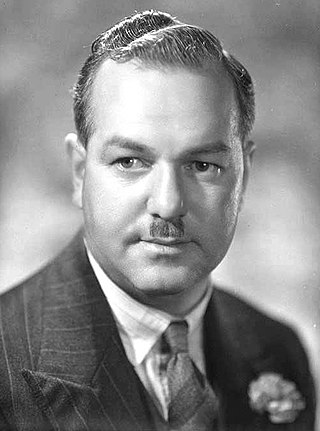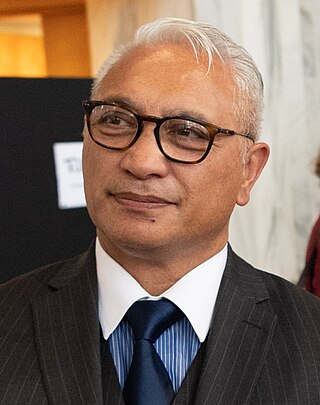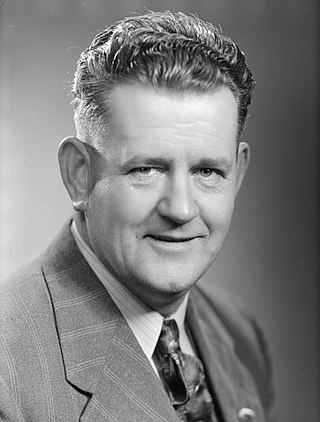
James Patrick Anderton was a New Zealand politician who led a succession of left-wing parties after leaving the Labour Party in 1989.

The 1990 New Zealand general election was held on 27 October to determine the composition of the 43rd New Zealand parliament. The governing Labour Party was defeated, ending its two terms in office. The National Party, led by Jim Bolger, won a landslide victory and formed the new government.
Matthew Peter Robson is a New Zealand politician. He was deputy leader of the Progressive Party, and served in the Parliament from 1996 to 2005, first as a member of the Alliance, then as a Progressive.

Maungakiekie is a New Zealand parliamentary electorate, returning one Member of Parliament to the New Zealand House of Representatives. The current MP for Maungakiekie is Greg Fleming of the National Party. The electorate's name comes from Maungakiekie / One Tree Hill, a large and symbolically important hill at the western end of the seat.
Frederick Miroslav Gerbic was a New Zealand politician of the Labour Party.
Frank Lewis Rogers was a New Zealand politician of the Labour Party.

John "Jock" Skinner Stewart was a New Zealand politician of the Labour Party.
Malcolm Douglas is a former New Zealand politician of the Labour Party. He lives in Karaka south of Auckland.

Peter Neilson was a New Zealand businessman and politician who was a Labour Party Member of Parliament in the New Zealand House of Representatives.

Onehunga, initially with the formal name of Town of Onehunga, is a former New Zealand parliamentary electorate in the south of the city of Auckland. Between 1861 and 1881, and between 1938 and 1996, it was represented by seven Members of Parliament. It was a stronghold for the Labour Party.

Peseta Samuelu Masunu "Sam" Lotu-Iiga is a former member of the New Zealand Parliament for the Maungakiekie electorate, having been elected in the 2008 election. Lotu-Iiga was one of two National Party Pasifika MPs. Lotu-Iiga holds the Samoan high chiefly title of Peseta.

Sir James Bell Donald was a United Party Member of Parliament and Cabinet Minister in Auckland, New Zealand.

The Maungakiekie-Tāmaki Local Board is one of the 21 local boards of the Auckland Council. It is the only local board overseen by the council's Maungakiekie-Tāmaki Ward councillor.

Alfred Ngaro is a New Zealand politician, serving as leader of NewZeal since 2023. He was a list member of the New Zealand House of Representatives from 2011 to 2020, representing the National Party.

The Tamaki by-election 1992 was a by-election held in the Tāmaki electorate during the 43rd New Zealand Parliament, on 15 February 1992. It was caused by the resignation of incumbent MP Sir Robert Muldoon and was won by Clem Simich with a majority of 1,252. The by-election was also notable as the first contested by the recently formed Alliance Party, and for their success in coming second ahead of the Labour Party.

Denise Adrienne Lee is a New Zealand politician who was the National Party's Member of Parliament for the Maungakiekie electorate from 2017 to 2020. She was previously an Auckland Council local body councillor.
The Otahuhu by-election 1963 was a by-election held in the Otahuhu electorate in Auckland during the term of the 33rd New Zealand Parliament, on 16 March 1963.

The Onehunga by-election 1953 was a by-election held in the Onehunga electorate in Auckland during the term of the 30th New Zealand Parliament, on 19 December 1953. The by-election was won by Hugh Watt of the Labour Party.

Auckland Future is a centre-right political ticket that ran for local seats under the Auckland Council in 2016. It campaigned on a fiscally conservative platform. It did not stand candidates in the 2019 election.
The Backbone club was a ginger group within the New Zealand Labour Party in the late 1980s and early 1990s that advocated neoliberal economic policies and supported Roger Douglas in his financial reforms of New Zealand. Its members later became the nucleus of ACT New Zealand, a neoliberal party which Douglas founded in 1994.















